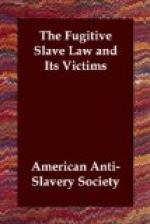a mile and a half by the blood.” The
other slave was secured and taken back to Kentucky,
“much bruised and cut in the affray.”
“The white man,” says the same paper, “was
also caught and beaten in a very severe manner
with a club, and strong hopes are entertained
that he will die.”—Wilmington
(Ohio) Republican, July, 22, 1853.
A colored girl, between four and five years old, suddenly disappeared from Providence, R.I., July 13, 1853; at the same time, a mulatto woman, who had been heard to make inquiries about the child, was missing also. Believed to be a case of kidnapping.
A negro boy, says the Memphis Inquirer, “left his owner in this city,” and went on board the steamboat Aurilla Wood, bound for Cincinnati. By a telegraphic message he was intercepted, taken from the boat at Cairo, Illinois, and taken back to Memphis. (Summer, 1853.)
GEORGE W. MCQUERRY, Cincinnati, Ohio. A colored man, who had resided three or four years in Ohio, and married a free woman, by whom he had three children, was remanded to slavery by Judge McLean (August, 1853.) The man was taken by the United States Marshal, with a posse, across the river to Covington, Kentucky, and there delivered to his master!
Two men kidnapped
from Chicago, and taken to St. Louis. See
Chicago Tribune,
quoted in Standard, Aug. 27, 1853.
Three Slaves taken by Habeas Corpus, from steamboat Tropic, and brought before Judge Flinn, at Cincinnati, August, 1853. The woman Hannah expressed a wish to return to her master in the boat. Judge Flinn ordered her into the custody of the claimants without investigation. Judge F. asked Hannah if she had the custody of the child Susan, to which she answered that she had. Whereupon the Judge also ordered her back into the custody of the claimants, without examination. Mr. Jolliffe protested against ordering the child back without examination. The Court said they would take the responsibility. The examination then proceeded in the case of the man Edward. It appeared that they were purchased in Virginia, to be conveyed to Mississippi. The boat stopped at Cincinnati, and the slaves were twice taken by the agent of the owners on shore, and upon the territory of Ohio. Mr. Jolliffe commenced his argument at 7, P.M., and argued that the slaves, being brought by their owners upon free territory, were legally free. Mr. J., before finishing, was taken ill, and obliged to leave the court-room; he first begged the Court to adjourn until morning, which was refused by Judge Flinn. Judge Keys said the Ohio river was a highway for all States bordering on it, whose citizens had a right also to use the adjacent shores for purposes necessary to navigation. Mr. Zinn stated that Mr. Jolliffe had been obliged to retire, in consequence of illness, and had requested




